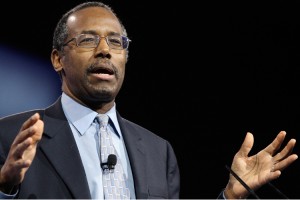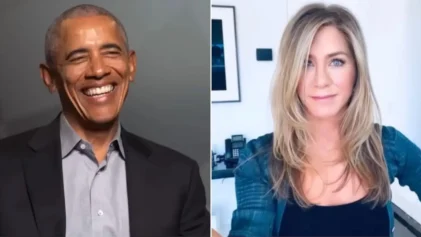
After conservative darling Dr. Ben Carson made his head-shaking comments that Obamacare was “the worst thing that has happened in this nation since slavery,” Roland Martin got a chance to confront him on Martin’s NewsOne radio show yesterday.
Noting that atrocities like Jim Crow arose after slavery, Martin asked him, “Did you go too far?”
“That’s my opinion,” Carson responded. “First of all, I recognize that slavery was a horrible thing … I realize how horrible it was … I didn’t say this is as bad as slavery, I said this is the worst thing since slavery.”
“Which includes Jim Crow,” Martin interrupted.
“Yes, absolutely,” the neurosurgeon and author said. “This nation was founded on the principle that it would be a new type of nation, that was for, of, and by the people. A constitution was put in place that would assure that the people remain at the pinnacle of power and that the central government would never reach the point where it had control of the people. [Obamacare] fundamentally changes the relationship.”
Carson said the Affordable Care Act will give the government control over “everyone’s health,” to which Martin responded by saying it empowers the individual.
Carson said the law gets in between the patient-provider relationship.
“This is only the beginning,” Carson continued. “What you will see is that a lot of the insurance companies will begin to fold … Ultimately, we will have a single-payer system if we don’t stop this from happening.”
Obamacare Opponents Bring Their Fight to the States
The effort to derail Obamacare, having failed in Congress, has now moved to the states, where well-funded groups are pressuring local lawmakers to resist the expansion of Medicaid — a major part of the law’s efforts to cover 48 million uninsured Americans.
In Virginia, Emmett W. Hanger Jr., a Republican state senator from the deeply conservative Shenandoah Valley, is feeling heat from the Republican right, specifically from groups like Americans for Prosperity, the conservative advocacy group backed by the billionaire industrialist brothers Charles and David Koch.
Hanger told the New York Times the group is waging “an attempt to intimidate me” in Richmond and at home by phoning his constituents, distributing leaflets and knocking on 2,000 doors in his rural district.
“This has been one of those trench warfare kind of efforts for a year now, and I think it is one of those hidden stories of the whole fight against Obamacare,” said Tim Phillips, president of Americans for Prosperity. “It’s not flashy; it’s just in a whole bunch of state capitals and in the districts of a whole lot of state legislators, but it’s such a crucial aspect of the overall long-term effort to roll back Obamacare.”
The expansion of Medicaid, a joint federal-state program for the poor, is critical to the law’s goal of covering the nation’s 48 million uninsured. Hospitals and insurers are counting on more Medicaid patients to make the economics of the law work. The federal government would pay 100 percent of the cost of new enrollees for the first three years and 90 percent after that.
But in June 2012, the Supreme Court ruled that states could opt out of Medicaid expansion, which opened the door for conservative opponents of the law to use Medicaid as an arena to oppose it. Americans for Prosperity has paid staff members in 34 states and is running aggressive campaigns in states like Arkansas, Florida, Ohio, Louisiana, Michigan and Pennsylvania.
Tea Party Patriots recently gave $20,000 to organizers of a referendum drive to put the question of Medicaid expansion on the Arizona ballot.
So far, roughly half the states are moving forward with Medicaid expansion and an increasing number of Republican governors are expressing interest.
Scholar Documents Prestigious Universities’ Connections to Slavery
A new book by Craig Steven Wilder, a history professor at the Massachusetts Institute of Technology, called “Ebony and Ivy: Race, Slavery, and the Troubled History of America’s Universities,” makes the provocative argument that the nation’s early colleges, alongside church and state, were “the third pillar of a civilization based on bondage.”
Universities such as Brown, Yale, Princeton, William and Mary, Harvard, Emory, the University of Maryland, the University of North Carolina at Chapel Hill and elsewhere have had scholars complete their own studies on the schools’ links to slavery. But according to the New York Times, Wilder’s book seems to be the first to look beyond particular campuses to take a broader look at the role of slavery in the growth of America’s earliest universities, which, he argues, were more than just “innocent or passive beneficiaries” of wealth derived from the slave trade.
“Craig shows that what happened at one institution wasn’t simply incidental or idiosyncratic,” said James Wright, a former president of Dartmouth College, which is discussed in the book. “Slavery was deeply embedded in all our institutions, which found ways to explain and rationalize slavery, even after the formation of the American republic.”
Obama Names African-American Lawyer to Take Over Homeland Security
President Barack Obama on Friday named Jeh Johnson, an African-American former Pentagon attorney, to run the Department of Homeland Security. The position will give Johnson a central role in the president’s immigration-reform efforts.
Johnson served as general counsel at the Pentagon during Obama’s first term but left to become a partner at a private law firm. At the Defense Department, Johnson was involved in ending the military’s ban on gays and in formulating the administration’s policy for the use of unmanned drones, in addition to working on counterterrorism, cybersecurity and disaster response— all issues he will have to address as head of Homeland Security.
“Jeh [pronounced Jay] has a deep understanding of the threats and challenges facing the United States,” Obama said in announcing the nomination at the White House.
Johnson, who has earned millions as a private lawyer, will succeed Janet Napolitano, who left the administration to take over the University of California system.
At his announcement, Johnson said being in Manhattan on 9/11 motivated him to pursue work in public service.
“I wandered the streets in New York and wondered, and asked, what can I do?” he said. “Since then, I have tried to devote myself to answer that question.”
Job Security May Be Primary Motivator for Conservative Republicans
After the lawmakers in Washington came to a bipartisan compromise to reopen the government and avert a default on government debt, insiders were hoping that the bipartisanship might extend to other issues like immigration reform. But Republican members of Congress quickly dashed such hopes.
“I think what [Obama] has done over the past two and a half weeks – he’s trying to destroy the Republican Party,” Congressman Raúl Labrador, an Idaho Republican once seen as a bridge to conservatives in the House on the question of legalizing undocumented migrants, told conservative activists on Wednesday. “I think that anything we do right now with this president on immigration will be with that same goal in mind, which is to destroy the Republican Party and not to get good policies.”
Senate Minority Leader Mitch McConnell said the real problem is Obama’s unwillingness to accept that he is not in charge of the government’s purse strings.
“I wish them well, but with all due respect to all of my congressional colleagues, there is only one Democrat who really counts: the president,” said McConnell in an interview with the Guardian. “He’s going to be there for three more years. Maybe he’ll have an epiphany.”
Political insiders say the real problem is the desire by Republicans to protect their jobs.
The 144 Republicans who voted against the agreement to reopen the government were not all Tea Party activists, but included many who feared that appearing to side with Democrats could invite a challenge from more conservative rivals during primary elections.
“The problem is that tactical decisions have been made into ideological decisions,” says Chris Henick, a Republican strategist and former adviser to George W Bush. “Somehow a senator or congressman who otherwise has a 98 percent rating from interest groups suddenly might face a primary challenge just because they disagreed with the [shutdown] strategy.”


